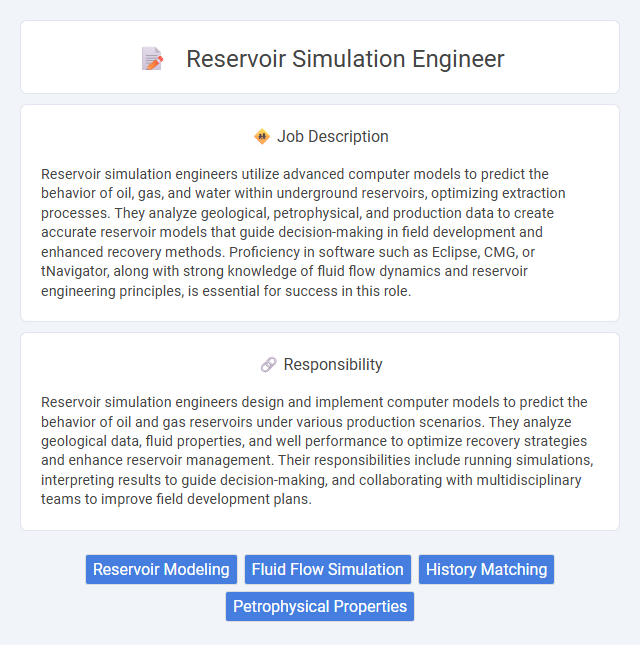
Reservoir simulation engineers utilize advanced computer models to predict the behavior of oil, gas, and water within underground reservoirs, optimizing extraction processes. They analyze geological, petrophysical, and production data to create accurate reservoir models that guide decision-making in field development and enhanced recovery methods. Proficiency in software such as Eclipse, CMG, or tNavigator, along with strong knowledge of fluid flow dynamics and reservoir engineering principles, is essential for success in this role.
Individuals with strong analytical skills and a solid understanding of geology and fluid mechanics are likely to be well-suited for a Reservoir Simulation Engineer role. Those who can manage complex data sets and enjoy solving intricate problems may find this job aligns with their strengths and interests. Candidates comfortable with collaborative environments and continuous learning might have a higher probability of success in this field.
Qualification
A Reservoir Simulation Engineer typically holds a degree in Petroleum Engineering, Chemical Engineering, or Geosciences, with strong expertise in reservoir characterization and numerical simulation software such as CMG, Eclipse, or Petrel. Proficiency in programming languages like Python, MATLAB, or R enhances model customization and data analysis. Experience in reservoir fluid dynamics, enhanced oil recovery methods, and geological modeling is essential for optimizing hydrocarbon recovery and field development planning.
Responsibility
Reservoir simulation engineers design and implement computer models to predict the behavior of oil and gas reservoirs under various production scenarios. They analyze geological data, fluid properties, and well performance to optimize recovery strategies and enhance reservoir management. Their responsibilities include running simulations, interpreting results to guide decision-making, and collaborating with multidisciplinary teams to improve field development plans.
Benefit
Reservoir simulation engineers likely benefit from enhanced decision-making capabilities through advanced modeling techniques that improve resource management and recovery efficiency. They probably experience career growth opportunities due to the specialized skills required in reservoir characterization and production forecasting. Competitive salaries and the potential for collaboration with multidisciplinary teams might further contribute to job satisfaction and professional development.
Challenge
Reservoir simulation engineers likely face complex challenges in accurately modeling fluid flow and reservoir behavior due to the inherent uncertainty in geological data. They probably encounter difficulties in integrating large datasets and applying advanced algorithms to predict reservoir performance under varying production scenarios. The role may demand innovative problem-solving skills to optimize reservoir management and maximize hydrocarbon recovery effectively.
Career Advancement
Reservoir simulation engineers leverage advanced modeling software to predict fluid behavior in subsurface reservoirs, enhancing recovery strategies and optimizing production. Mastery of reservoir simulation tools such as Eclipse, CMG, or Petrel improves technical expertise, paving the way for roles like senior simulation engineer, project manager, or reservoir management lead. Continuing education in data analytics, machine learning, and petroleum engineering, combined with hands-on experience in reservoir characterization, accelerates career progression in energy sector companies.
Key Terms
Reservoir Modeling
Reservoir simulation engineers specialize in creating detailed reservoir models to predict fluid behavior and optimize hydrocarbon recovery. They use advanced software like Eclipse, Petrel, and CMG to develop dynamic reservoir simulations that integrate geological, petrophysical, and production data. Accurate reservoir modeling supports decision-making in field development planning, enhanced oil recovery, and reservoir management strategies.
Fluid Flow Simulation
Reservoir simulation engineers specialize in fluid flow simulation to predict the movement of hydrocarbons within subsurface reservoirs, optimizing extraction strategies. They utilize advanced reservoir modeling software such as Eclipse, CMG, and Petrel to analyze multiphase flow behavior under varying pressure, temperature, and geological conditions. Accurate fluid flow simulation enhances recovery efficiency, reduces operational risks, and supports decision-making in field development planning.
History Matching
Reservoir simulation engineers specializing in history matching analyze production data to calibrate reservoir models, ensuring accurate predictions of fluid flow and reservoir performance. They use iterative techniques and advanced software tools like Eclipse, CMG, or tNavigator to minimize discrepancies between simulated results and historical production records. This process enhances decision-making for field development and optimizes reservoir management strategies.
Petrophysical Properties
Reservoir simulation engineers analyze petrophysical properties such as porosity, permeability, and fluid saturation to model subsurface reservoir behavior accurately. They integrate data from core samples, well logs, and seismic surveys to construct detailed reservoir models that predict fluid flow and optimize hydrocarbon recovery. Mastery of petrophysical analysis enables precise calibration of simulation parameters, improving reservoir management and production strategies.
 kuljobs.com
kuljobs.com